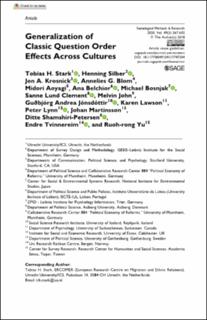Generalization of Classic Question Order Effects Across Cultures
| dc.contributor.author | Stark, Tobias | |
| dc.contributor.author | Silber, Henning | |
| dc.contributor.author | Krosnick, Jon A. | |
| dc.contributor.author | Blom, Annelies G. | |
| dc.contributor.author | Aoyagi, Midori | |
| dc.contributor.author | Belchior, Ana | |
| dc.contributor.author | Bosnjak, Michael | |
| dc.contributor.author | Clement, Sanne Lund | |
| dc.contributor.author | John, Melvin | |
| dc.contributor.author | Jónsdóttir, Guðbjörg Andrea | |
| dc.contributor.author | Lawson, Karen | |
| dc.contributor.author | Lynn, Peter | |
| dc.contributor.author | Martinsson, Johan | |
| dc.contributor.author | Shamshiri-Petersen, Ditte | |
| dc.contributor.author | Tvinnereim, Endre | |
| dc.contributor.author | Yu, Ruoh-rong | |
| dc.date.accessioned | 2021-02-01T14:27:44Z | |
| dc.date.available | 2021-02-01T14:27:44Z | |
| dc.date.created | 2021-01-31T16:57:05Z | |
| dc.date.issued | 2020 | |
| dc.identifier.issn | 0049-1241 | |
| dc.identifier.uri | https://hdl.handle.net/11250/2725636 | |
| dc.description.abstract | Questionnaire design is routinely guided by classic experiments on question form, wording, and context conducted decades ago. This article explores whether two question order effects (one due to the norm of evenhandedness and the other due to subtraction or perceptual contrast) appear in surveys of probability samples in the United States and 11 other countries (Canada, Denmark, Germany, Iceland, Japan, the Netherlands, Norway, Portugal, Sweden, Taiwan, and the United Kingdom; N = 25,640). Advancing theory of question order effects, we propose necessary conditions for each effect to occur, and found that the effects occurred in the nations where these necessary conditions were met. Surprisingly, the abortion question order effect even appeared in some countries in which the necessary condition was not met, suggesting that the question order effect there (and perhaps elsewhere) was not due to subtraction or perceptual contrast. The question order effects were not moderated by education. The strength of the effect due to the norm of evenhandedness was correlated with various cultural characteristics of the nations. Strong support was observed for the form-resistant correlation hypothesis. | en_US |
| dc.language.iso | eng | en_US |
| dc.rights | CC BY-NC 4.0 | |
| dc.rights.uri | https://creativecommons.org/licenses/by-nc/4.0/ | |
| dc.title | Generalization of Classic Question Order Effects Across Cultures | en_US |
| dc.type | Peer reviewed | en_US |
| dc.type | Journal article | en_US |
| dc.rights.holder | © 2020, Authors | |
| dc.description.version | publishedVersion | en_US |
| cristin.ispublished | true | |
| cristin.fulltext | original | |
| cristin.qualitycode | 2 | |
| dc.identifier.doi | 10.1177/0049124117747304 | |
| dc.identifier.cristin | 1883928 | |
| dc.source.journal | Sociological Methods & Research | en_US |

